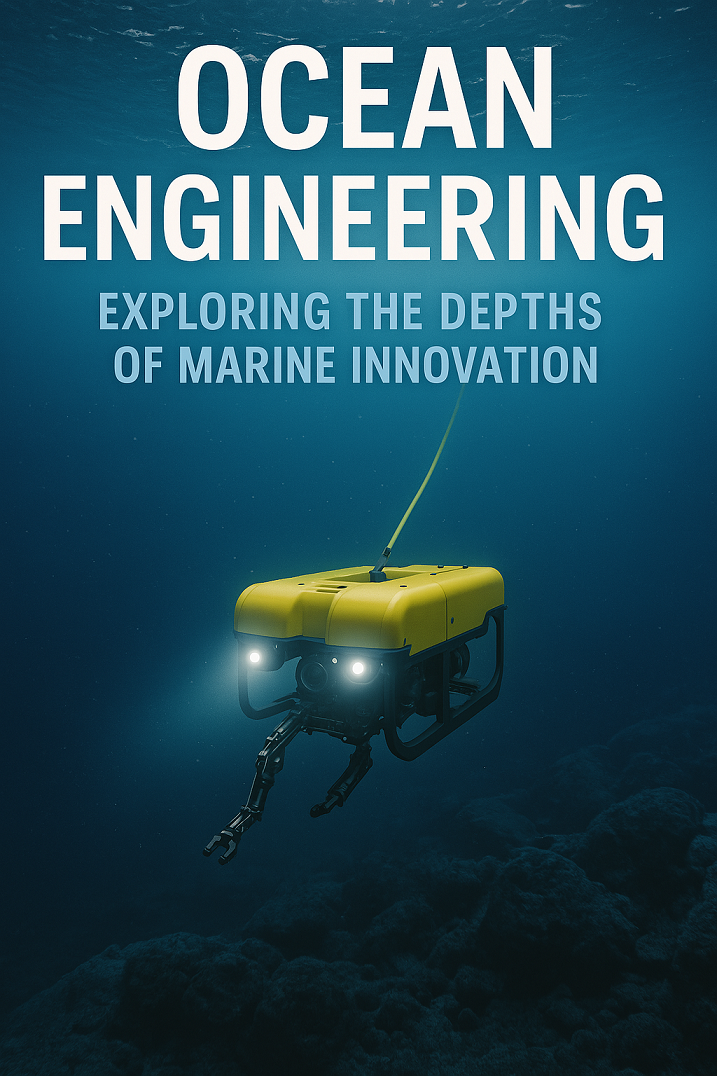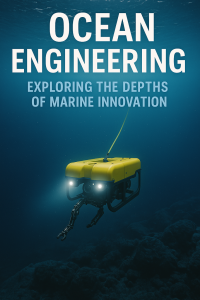What is ocean engineering? Discover its meaning, applications, latest technologies, and career opportunities. A complete guide for maritime students, cadets, ship officers, shipping companies, and marine professionals.
Engineering the Future of the Ocean
Did you know that over 70% of the Earth is covered by oceans, yet we have explored less than 20% of it in detail? From offshore energy platforms to subsea robots and resilient coastal structures, ocean engineering plays a vital role in exploring, protecting, and utilizing our marine environment.
This educational, SEO-optimized, and comprehensive guide introduces ocean engineering, its meaning, importance, applications, and emerging trends—designed for maritime students, cadets, ship officers, shipping companies, and marine enthusiasts.
What Is Ocean Engineering?
Ocean engineering is a multidisciplinary field that combines mechanical, civil, electrical, and environmental engineering principles to design, develop, and maintain structures and technologies used in ocean environments.
It encompasses:
-
Offshore oil and gas infrastructure
-
Renewable ocean energy systems (e.g., wave, tidal, wind)
-
Subsea robotics and sensors
-
Coastal protection and erosion control
-
Underwater acoustics and communications
🌊 Ocean engineering is also known as marine engineering’s “cousin,” focusing on infrastructure and technology beyond ships and engines.
Key Concepts and Core Areas
🔧 1. Offshore Structures and Platforms
-
Design of oil rigs, floating production systems, and wind farms
-
Stability, mooring systems, and material resilience in harsh environments
⚙️ 2. Hydrodynamics and Ocean Mechanics
-
Study of wave forces, tides, and currents on engineered structures
-
Essential for ship resistance analysis, wave energy capture, and marine construction
🧪 3. Subsea Systems and Robotics
-
Autonomous Underwater Vehicles (AUVs)
-
Remotely Operated Vehicles (ROVs) for inspection and repair
-
Pipeline and cable laying robots
🛡️ 4. Coastal Engineering
-
Shoreline protection structures like seawalls and breakwaters
-
Beach nourishment and erosion control techniques
-
Resilient design for sea level rise and extreme storms
🌱 5. Environmental and Ocean Renewable Energy
-
Harnessing energy from tides, waves, currents, and offshore wind
-
Reducing environmental impact of offshore installations
-
Supporting marine biodiversity and sustainable development
Why Is Ocean Engineering Important?
🌍 Global Impact
-
Supports safe energy extraction in oceans
-
Enables sustainable ocean exploration
-
Protects coastal communities from rising seas
-
Contributes to marine environmental monitoring
💡 According to the U.S. Bureau of Labor Statistics, the demand for ocean engineers is expected to grow due to rising needs for renewable energy and climate-resilient infrastructure.
Real-World Applications & Case Studies
⚓ Offshore Wind Farms – North Sea
Ocean engineers developed deep-water floating turbines to withstand 40+ meter waves, ensuring stable energy production.
🐠 Coral Reef Restoration – Caribbean
Engineered modular reef units help regenerate damaged ecosystems using 3D-printed structures based on hydrodynamic simulations.
🚢 Autonomous Ocean Vehicles – Arctic
AUVs equipped with sonar and GPS technology support under-ice data collection, aiding polar climate research and navigation.
Ocean Engineering Careers and Education
👩🎓 For Students and Cadets
-
Degree programs often include fluid mechanics, marine structures, robotics, naval architecture, and environmental science
-
Internships with offshore engineering firms, coastal construction companies, or research institutes are highly valuable
💼 Career Opportunities
-
Ocean engineer or marine engineer
-
Offshore project manager
-
Subsea systems designer
-
Coastal infrastructure consultant
-
Researcher in ocean energy or climate adaptation
📘 STCW certification is not always required but can be beneficial for working aboard survey vessels or offshore platforms.
Latest Trends and Future Outlook
🌊 Top Innovations in Ocean Engineering
-
Blue energy technologies (wave, thermal, salinity)
-
AI and machine learning in AUV route planning
-
Floating cities and maritime habitats
-
Ocean carbon capture and negative emissions projects
📈 Outlook
-
With increasing investments in sustainable marine infrastructure, ocean engineering is set to play a pivotal role in the blue economy, expected to reach $3 trillion by 2030 (OECD).
FAQs: People Also Ask
What is ocean engineering?
Ocean engineering is the study and application of engineering principles to the marine environment, involving offshore structures, coastal protection, robotics, and ocean energy systems.
How is ocean engineering different from marine engineering?
Marine engineering focuses on ship systems and propulsion, while ocean engineering deals with offshore and underwater structures and technologies.
What are some ocean engineering projects?
Examples include offshore wind farms, ROV systems for oil rigs, artificial reefs, and wave energy converters.
Is ocean engineering a good career?
Yes. It’s in high demand for energy, climate resilience, and sustainable marine development, with opportunities in both private industry and research.
Conclusion: Engineering for the Blue Frontier
Ocean engineering bridges innovation and sustainability, empowering humanity to responsibly use, explore, and protect the vast marine world. From building resilient coastlines to powering cities from ocean waves, ocean engineers are at the forefront of the blue economy revolution.
⚓ Ready to explore more?


